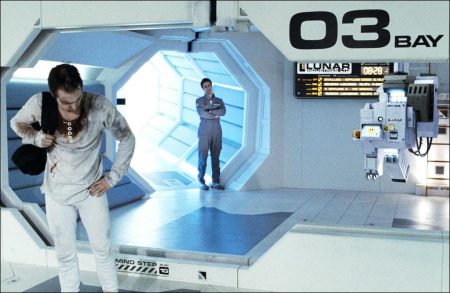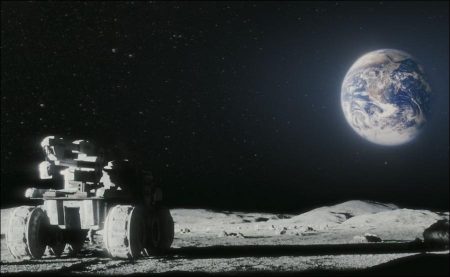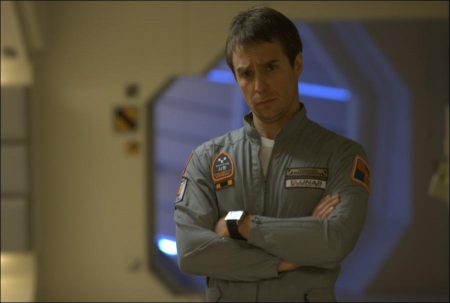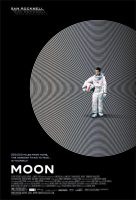Tagline: 250.000 miles from home, the hardest thing to face… is yourself.
Moon movie storyline. It is the near future. Astronaut Sam Bell is living on the far side of the moon, completing a three-year contract with Lunar Industries to mine Earth’s primary source of energy, Helium-3. It is a lonely job, made harder by a broken satellite that allows no live communications home. Taped messages are all Sam can send and receive.
Thankfully, his time on the moon is nearly over, and Sam will be reunited with his wife, Tess, and their three-year-old daughter, Eve, in only a few short weeks. Finally, he will leave the isolation of “Sarang,” the moon base that has been his home for so long, and he will finally have someone to talk to beyond “Gerty,” the base’s well-intentioned, but rather uncomplicated computer.
Suddenly, Sam’s health starts to deteriorate. Painful headaches, hallucinations and a lack of focus lead to an almost fatal accident on a routine drive on the moon in a lunar rover. While recuperating back at the base (with no memory of how he got there), Sam meets a younger, angrier version of himself, who claims to be there to fulfill the same three year contract Sam started all those years ago. Confined with what appears to be a clone of his earlier self, and with a “support crew” on its way to help put the base back into productive order, Sam is fighting the clock to discover what’s going on and where he fits into company plans.
Moon is a 2009 British science fiction drama film co-written and directed by Duncan Jones. The film follows Sam Bell (Sam Rockwell), a man who experiences a personal crisis as he nears the end of a three-year solitary stint mining helium-3 on the far side of the Moon. It was the feature debut of director Duncan Jones. Kevin Spacey voices Sam’s robot companion, GERTY. Moon premiered at the 2009 Sundance Film Festival and was released in selected cinemas in New York and Los Angeles on 12 June 2009. The release was expanded to additional theatres in the United States and Toronto on both 3 and 10 July and to the United Kingdom on July 17.
Moon was modestly budgeted and grossed just under $10 million worldwide but was well received by critics. Rockwell’s performance found praise as did the film’s scientific realism and plausibility. It won numerous film critic and film festival awards and was nominated for the BAFTA Award for Best British Film.. Moon grossed £700,394 from its domestic release, $3,370,366 from its North American release and $9,760,104 worldwide making the film a modest financial success.
About Moon
MOON is a story full of paradoxes. It’s an intimate character portrayal in a starkly impersonal outer-space setting; a three-man drama with just a single actor visible onscreen; and a futuristic vision that harkens back to classic sci-fi, but also looks a lot like utilitarian heavy industry as we know it. “There is a reason why “indie” and “science fiction” are rarely seen together in the same sentence,” observes MOON director Duncan Jones.
“Sci-fi by its very nature often demands the biggest production values, and, as you can imagine, that’s the hardest thing to achieve with an indie budget. So putting MOON together was an intricate puzzle: we wanted to tell a story that was both intimately human but universal in appeal; we wanted to keep our cast small and our shooting environment completely controllable; and we wanted to get every last drop of screen value out of our visual effects. It was hugely ambitious, but it paid off-we made an honest-to-goodness science fiction film, with an intense story, an amazing performance by an extraordinary actor, chock-full of gorgeous special effects, and we did it in 33 days and on a small budget.”
Inspiration
Jones-a self-described “sci-fi geek”-has long been fascinated with both the lunar landscape and the cinematic classics of the outer space genre: “Alien, Silent Running, Outland, and 2001: A Space Odyssey-the golden era sci-fi films I grew up with. If Gerty [the computer voiced by Kevin Spacey], the Sarang [the moon station], the rovers and harvesters have a retro aesthetic to their design, it’s no accident. We were creating an homage to that golden era.”
The moon itself also inspired Jones’s story treatment, upon which Nathan Parker’s screenplay is based. “The moon is an obvious but ignored location for a science fiction story. It’s only been 40 years since we first traveled to the moon, and it gives me goose pimples to think that the moon could be the source of enough renewable energy to keep our entire planet energy-sated for the next few hundred years. More than that, everyone feels a personal connection to the Moon. Every night, it is science fiction sitting in our eye line.”
MOON’s human element drew inspiration from a very human source: “MOON was written for Sam Rockwell,” says Jones. Rockwell, recently seen in the critically acclaimed Ron Howard feature Frost/Nixon, is known for picking diverse roles, ranging from The Assassination of Jesse James to Charlie’s Angels to The Hitchhiker’s Guide to the Galaxy to Choke.
“I’d met with Sam about a year before making MOON to talk to him about another project. It didn’t work out, but it came up that Sam was into sci-fi and that if I had something in that genre, he would love to see it. As soon as the meeting was over, I got to work. I needed to write a sci-fi film starring Sam Rockwell!”
Continue Reading and View the Theatrical Trailer
Moon (2009)
Directed by: Duncan Jones
Starring: Sam Rockwell, Kaya Scodelario, Benedict Wong, Matt Berry, Malcolm Stewart, Dominique McElligott, Adrienne Shaw, Rosie Shaw, Kevin Spacey, Matt Berry, Malcolm Stewart
Screenplay by: Duncan Jones, Nathan Parker
Production Design by: Tony Noble
Cinematography by: Gary Shaw
Film Editing by: Nicolas Gaster
Costume Design by: Jane Petrie
Art Direction by: Hideki Arichi
Music by: Clint Mansell
MPAA Rating: R for language.
Distributed by: Sony Pictures Classics
Release Date: June 12, 2009
Views: 142






